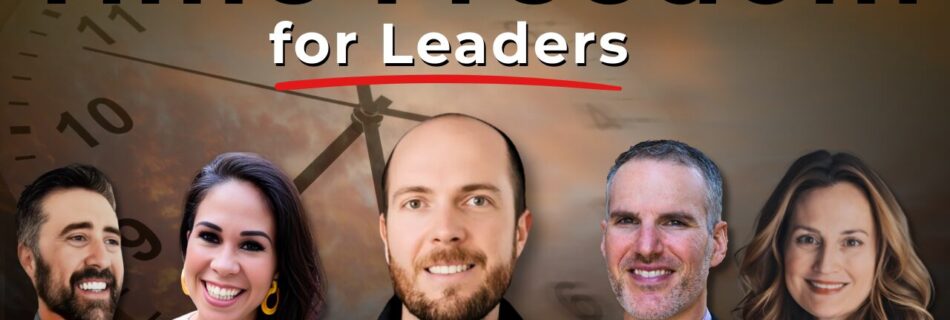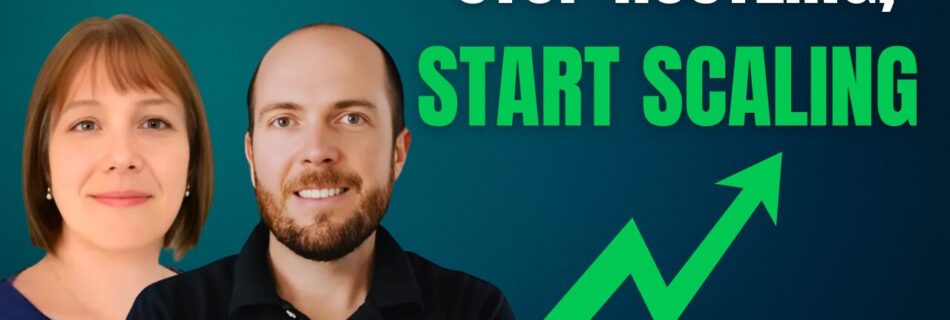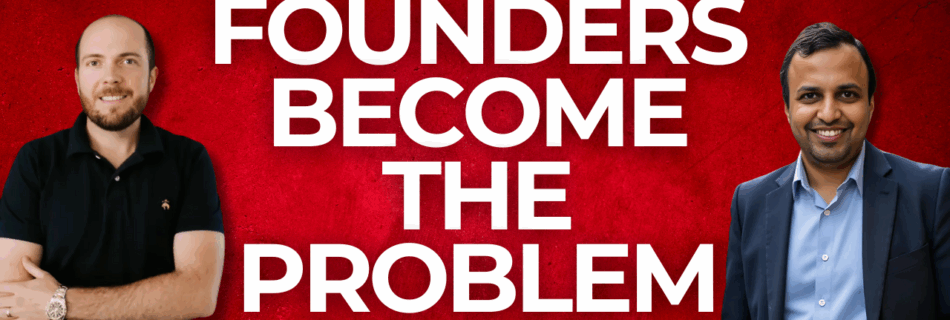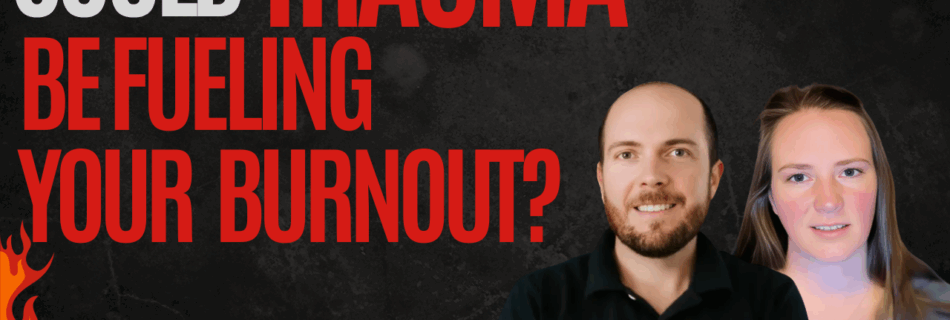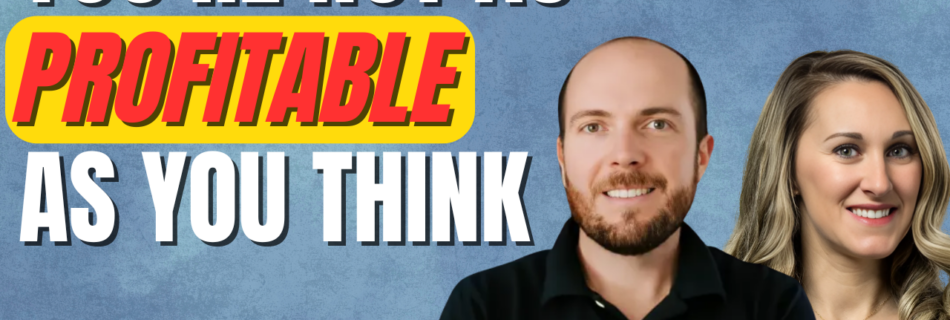How to Scale Your Business Without Burning Out
Key Lessons from the Executive Edge Live Panel on Sustainable Growth
Scaling a business is exciting—but for many founders, growth quietly turns into chaos, burnout, and stalled execution.
In this Executive Edge Live panel, hosted by Harley Green, Founder & CEO of Workergenix, four seasoned operators and advisors share what actually makes growth scalable, sustainable, and leadership-friendly.
If you’re a founder or CEO planning to scale in 2026, here’s what you need to know.
Preferred listening on the go? Catch the full podcast episode on Spotify and Apple Podcasts.
Vision Isn’t the Problem—Capacity Is
Most leaders don’t lack vision. They lack bandwidth.
When everything runs through the founder, growth plans collapse under calendar overload and decision fatigue. The panel emphasized planning around real capacity, not hope.
Takeaway: If your time is maxed out, your growth plan is fiction.
Leaders Consistently Underestimate Risk, Time, and Cost
Entrepreneurs are wired to take risks—but that strength is also a liability.
Philip Williams (The Numbers Advisors) shared that most leaders underestimate how long and how expensive scaling will be.
Rule of thumb: Add 50% more time and money to your growth plan.
Sustainable growth requires financial discipline, contingency planning, and advisors who will challenge assumptions.
Scaling Requires the Right People—Not Just More People
Growth exposes talent gaps fast.
Justin Janowski (Faith2Influence) highlighted one of the hardest leadership responsibilities: letting go of the wrong people, even when you care about them.
Holding on too long creates drag across the organization and limits who the company can become.
Hard truth: Protecting the future sometimes means making uncomfortable decisions today.
Simplicity Beats Complexity in Growth Planning
Many growth plans fail because they’re too complex to execute.
Bryan Boettger (Estate Four) introduced a powerful framework using fidelity levels:
Low fidelity for long-term vision (3–5 years)
Medium fidelity for near-term priorities
High fidelity for immediate execution
Clear milestones and stage gates matter more than detailed forecasts.
Execution Risk Is a People Problem, Not a Technology Problem
As businesses scale, leaders often underestimate change management.
Josh Santiago (Santiago & Company) explained that execution fails when teams aren’t prepared for new systems, processes, or expectations—even when the strategy is sound.
Key insight: If people don’t believe the plan is achievable, it won’t work.
Sustainable Growth Depends on Leadership Maturity
The panel closed with a simple but critical reminder:
Your leadership team must grow as fast as your business.
That means:
Delegating early
Building leadership pipelines
Valuing truth-seekers over yes-people
Using data to ground decisions
Designing a business that doesn’t rely on the founder for everything
Connect with the Panelists
Justin Janowski – Founder, Faith2Influence
High-integrity sales strategies for coaches and entrepreneurs
🌐https://www.faith2influence.com
🔗https://www.linkedin.com/in/justinjanowski/
🎁 Get his free 10-step sales process by texting SALES to 55444
Josh Santiago – Managing Partner, Santiago & Company
Management consulting focused on unlocking portfolio value
🌐https://www.santiagocompany.com
🔗https://www.linkedin.com/in/joshsantiagokc
Philip Williams – Principal, The Numbers Advisors
Bookkeeping clarity and value-driven exit planning
🌐https://www.thenumbersadvisors.com
Bryan Boettger – Principal & Lead Strategist, Estate Four
Strategy and execution for construction and industrial brands
🌐http://www.estatefour.com
🔗https://www.linkedin.com/in/bryanboettger/
Final Thought
Scaling isn’t about moving faster.
It’s about building the structure, leadership capacity, and clarity to grow without breaking what already works.
If scaling your business is stretching your time and focus, an Ultimate Executive Assistant from Workergenix can help you reclaim 15–30 hours a week and lead with clarity.
Book a discovery call to see how the right executive support creates growth without chaos.
Like what you read? Get weekly insights on scaling, efficiency, and profitability—straight to your inbox. Click here to subscribe.Transcript:
Harley Green:
All right, welcome everyone to Executive Edge Live. I’m Harley Green, founder and CEO of Workergenix. Now at Workergenix, we help high-performing leaders reclaim time and focus by pairing them with Ultimate Executive Assistants who reduce operational drag and increase leadership bandwidth. These sessions are one way that we support the broader business community with real conversations about what actually works at scale.
Today’s conversation is going to be focused on vision and planning for scalable growth. Very appropriate here for the new year. A lot of leaders don’t really struggle with vision so much as they struggle with the bandwidth side of things. And when everything runs through you and your calendar is full, even strong plans and vision can stall.
So today we’re unpacking how leaders can set growth targets that are ambitious but executable, plan around real capacity, not just hope, and reduce leadership drag that quietly eats 15 to 30 hours a week so that you can build planning structures to support execution and not just strategy.
You’ll hear practical insights from real-world experiences and honest trade-offs from the leaders who’ve built growth plans that hold up under pressure, our amazing panelists. And a quick note before we begin, today’s session will also be featured on our podcast, Scale Smart, Grow Fast. So if something resonates with you today, you’ll be able to revisit again in the conversation later, wherever you get your podcasts.
So let’s go ahead and dive right in and get to know our panelists. Justin, let’s start with you. Go ahead and introduce yourself to our audience today.
Justin Janowski:
Hey, thanks for having me. I’m Justin Janowski. I run a company called Faith to Influence, and I help Christian coaches and entrepreneurs as my primary target audience with high-integrity sales strategies. I know that many people who are building businesses are trying to figure out the right pricing, the right irresistible offer, and the right sales strategy to grow.
And for my audience specifically, sales is the thing they want to do the least, but they need the most. And so I help people do that really well in a way that feels good for them and their prospects, that has integrity, and makes it easy for the right people to say yes.
Harley Green:
Thank you so much, Justin, for joining us. Josh, how about you?
Josh Santiago:
Absolutely. Thank you so much. It’s a pleasure to be here. My name is Josh Santiago. I’m one of the managing partners and founder of a firm that I started called Santiago & Company. So we are a management consulting firm that specializes in helping mid-market enterprise companies isolate and identify portfolio value across the entire chain and then really dive into that.
So this is a conversation that’s near and dear to my heart because I spend a lot of time helping organizations, even at the very top, uncover these issues and really dial it back. So it’s nice to get back into the small business side of things and help give back there.
Harley Green:
It’s great having you here today, Josh. All right, Philip, how about you? Can you introduce yourself?
Philip Williams:
Good morning. Thank you for having me, Harley. I appreciate the invitation. Super cool to be on the panel with all these cool chaps here. I run an advisory firm that handles bookkeeping so that business leaders can get their numbers on time. Massive frustration for a lot of us.
And then on the backside, we also do exit planning advising, which deals a lot with building value in the business and expanding the valuation on the company before an owner decides to exit.
Harley Green:
Thank you so much, Philip. And last but certainly not least, Bryan, go ahead and introduce yourself to the audience.
Bryan Boettger:
Thank you. Brian from Estate Four. I’m the principal and lead strategist. I’ve been in the agency and consultant space for like 25 years now and worked across a variety of spots. American Express, Google, YouTube, Toyota, all kinds of things, but also smaller companies as well.
And I focus now predominantly on the construction and industrial space. So that’s kind of where I found my home at this point in time.
Harley Green:
As you can see, we’ve got a power-packed panel here today. So let’s just dive right in with the first question here. This is open to everyone. So if you’ve got something you want to share, please just jump right in.
And the first question today we’re going to focus on is scalable growth. When you think about scalable growth, what do you see leaders most often getting wrong in their planning?
Philip Williams:
I’ll jump in. The number one thing is they think it’s going to happen faster and less expensively than it really is. Whatever your number is, probably you should add 50 percent on time and money.
Josh Santiago:
I think the other thing too that I see is capacity. I think planning around capacity to hit scalability is another one. It’s a huge underinvestment. Everybody thinks they’ve got unlimited bandwidth and we all love the five to nine, but it’s one of those things that you’ve got to balance capacity as well across the organization.
Bryan Boettger:
If we’re looking at leaders, and I think a lot of what you’re focusing on is leadership, I think it’s important to identify the difference between leadership and management and what role you’re filling within that. And too often people focus on the what and the how instead of the why and the where.
And as a true leader, if you focus on where we’re going and why we want to get there, and then you either offload or collaborate with your team for the what and how, that’s the only way it’ll work in the long term.
Justin Janowski:
For me, I’ll add that sustainability is one of the key components leaders need to think about. How can we grow in a way that’s sustainable, a way that feels good long term, that supports the lifestyle we want, the business we want, the culture and values of the business?
And so it’s about having the right people in place, the right systems and processes so that the scaling isn’t just an exciting moment, but something that’s lasting and done the right way.
Harley Green:
I heard you.
Bryan Boettger:
Also, the scaling aspect, it’s not like a final destination either. One of the problems is people just look at what’s that end goal instead of looking at what are the milestones to get there.
And people try to do goal setting or don’t even do goal setting at all. It’s crazy how often people don’t set goals. They just say, “We’re going to grow, we’re going to do whatever,” but not only setting an end goal, but what are the stage gates to get there so you can do quality checks as you go.
Harley Green:
One of the things that I’ve heard here in this discussion was that sometimes leaders can underestimate the amount of effort or resources that it’ll take. Why do you guys think that is? Especially people who’ve been in business more than a year and understand that things are harder than they often look on the surface. Why do leaders continually fall into that trap, and what tips or strategies would you offer for them to be more realistic?
Justin Janowski:
A lot of leaders are visionary types. They see the big goal, the big picture, and where they want to go. They’re great at communicating that, and there’s often a charisma around their ability to sell people on it and get people excited.
But many leaders are missing the integrator, the down-to-earth analytics of what it’s actually going to take to make that vision come alive. And so partnering with team members and trusted advisors, coaches, mentors, and others who can see what actually has to happen to bring the vision to life is really important.
Many visionaries just have the big idea and they start sharing it before the path is clear.
Josh Santiago:
I think Justin brings up a great point. It’s the marriage between the visionary and the integrator. If you look at a lot of great companies throughout history, Apple with Steve Jobs and Steve Wozniak, Microsoft with Bill Gates and Paul Allen, there was always a strong visionary and an equally strong executor.
And I think that becomes such a hard thing to do sometimes when you’re just getting started or even when you’ve been in business for a few years, finding somebody you can tie yourself to who’s not only going to help push the vision forward, but also bring you back to reality.
You’re like, “Yeah, we’re going to grow 40 percent next year,” and it’s like, “Well, we don’t even have the staff to do that. Hold on just a second.” Finding the two is super helpful.
Philip Williams:
I’ll just add that as an entrepreneur, the fundamental thing that allows us to do what we do is also an Achilles heel. And that is this: entrepreneurs are like adolescents in their inability to assess risk.
We are willing to leave the house without a bunch of guaranteed green lights to get across town. There are other people that need to know every light is going to be green when they get there. So you need somebody to help compensate for your positive success wiring.
Josh Santiago:
Well said.
Philip Williams:
As you’re saying, you need somebody to help compensate for your positive success wiring.
Bryan Boettger:
I think one way to mitigate against that, and I totally agree one hundred percent, is something I actually did when I started this company from my last one. I did a lot of self-assessment around what my risk level was and how I protect myself from myself.
But in general, looking at the companies we work with, you have to ask whether your success is because your company is reactive to customer needs or proactive to customer needs. If you’re reactive, scalability and growth are going to be harder. If you’re proactive, that usually means you’re more ready.
Another way to look at that is people versus process. Are you successful because of your people solely, or are you successful because you have process? If you actually have that foundational process piece, then that’s something you might be able to grow and sustain.
Philip Williams:
And do you have a process for finding people?
Josh Santiago:
Yeah.
Bryan Boettger:
Yeah.
Harley Green:
Absolutely. Brian, back to you. You touched on this a little bit. You’ve spent your career helping organizations simplify their strategies. Where do growth plans usually become too complex to execute? And how can leaders create clarity without oversimplifying?
Bryan Boettger:
A great visual that helps a ton is thinking about fidelity levels, like looking at a picture and how pixelated it is. If you look at a billboard up close, it’s totally pixelated, but from far away it has clarity even with low fidelity.
As you get closer, you need higher fidelity. Our phones are high fidelity because they’re right in front of our faces. Strategy should work the same way. Start with low fidelity for three to five years. Personally, I think anything beyond five years is a fool’s quest.
Then bring it in two-thirds for medium fidelity. Then bring it in another third for high fidelity. You increase fidelity as you get closer to execution.
Harley Green:
Josh, any input on the fidelity piece of goal strategy?
Josh Santiago:
Yeah, I love this because we practice it at the corporate level, and I like bringing it back down. I’ve done a lot of work with nonprofits. McKinsey developed the Three Horizons model years ago.
Horizon One is where you’re at today, the core business sustaining the organization. Horizon Two has commercial viability but isn’t widespread yet. Horizon Three is where visionaries love to play. No EBITDA impact yet, just ideas.
Where people get out of sorts is sequencing. You should spend about seventy percent of your time in Horizon One, high fidelity, what you’re working on today. Thirty percent in Horizon Two. And ten percent in Horizon Three so visionaries don’t feel stifled.
That balance keeps execution moving while allowing innovation.
Harley Green:
That’s a great breakdown of time and resource allocation. Justin, you work closely with founders setting ambitious income and impact goals. How do you help leaders stretch without overwhelming capacity or values?
Justin Janowski:
We want goals that stretch us but stay in the realm of possibility. Some people advocate setting unachievable goals so you land somewhere good. I prefer something we actually believe we can achieve.
Belief changes behavior. When the leader and team believe the goal is achievable, they act differently. The goal should require a new version of you, but still feel possible.
It’s different for everyone. Sometimes it’s a smell test. Does it feel true? One of my mentors would say, “I hear what you’re saying, but I don’t believe it yet.” Sometimes asking the question multiple times gets to a truer answer.
Philip Williams:
Hey Justin, have you ever heard of Edwin Locke and Gary Latham?
Justin Janowski:
I haven’t.
Philip Williams:
They published a paper in 2002 on self-belief and goal achievement. In corporate settings, you’ve probably heard someone in the back of the room say, “That’ll never happen,” when leadership announces a big goal. That’s lack of belief.
I actually helped put a company on the Inc. 5000 using that theory. Self-belief matters. If the team doesn’t believe they can do it, that’s the first gap.
Josh Santiago:
I love asking the question, “What has to be true for us to get here?” It balances vision with execution. If you want forty percent growth, what has to change? More staff, new systems, new processes?
As you hit small milestones, belief accelerates.
Philip Williams:
When you give someone a goal they’ve never achieved, and they don’t know anyone who has, you’ve lost most of the battle. There’s a physiological response that says, “I can’t do this.” You have to address that.
Justin Janowski:
That’s why breaking goals into the smallest actions matters. Whether the goal is one hundred thousand or ten million, break it into sales, calls, messages.
Often, what it takes is smaller than people think. Many solopreneurs would hit goals just by sending ten messages a day consistently.
Philip Williams:
And the complement to that is asking, what three things do you do that shoot yourself in the foot? Write them down and stop doing them.
Sometimes winning is just not losing. People delay calls, delay proposals, and let momentum slip. Stop doing those three things and results improve.
Bryan Boettger:
Parallel to that is distraction. The Eisenhower Matrix of urgent versus important is powerful. It helps you decide what to focus on, what to delegate, and what to ignore.
Josh Santiago:
Delegation is one of the biggest challenges as businesses grow. Learning to hand things off early accelerates everything.
Philip, on the exit side, when owners delegate well, does exiting become easier?
Philip Williams:
Absolutely. If you want a good multiple, you better delegate well and have a team worth delegating to. If you have those things, you might not even want to exit.
Bryan Boettger:
That theme of identifying the next generation of leaders keeps coming up. Whether exiting or not, scale requires new leaders.
If you plan to grow fast, start interviewing now. It takes time.
Philip Williams:
And investors consistently say business owners struggle to identify and develop good talent. That needs to be top of mind.
Josh Santiago:
Yeah, such a good point. I spend a lot of time coaching leaders on building that pipeline. Brian, to your point, building that next generation of leaders is so important. Not only is it expensive to hire people, but it’s even more expensive to rehire. When you bring someone along on the journey, they’re bought into the vision and running at the same pace.
It also gives them a stake in the organization. Retention goes up. Beyond that, building a runway or pipeline of talent is critical because it takes time to develop these skill sets. Leaders need to think ahead. If we’re going to grow from X to Y, what skills will people need to support that?
Many people entering the workforce want to know what the next role looks like and how to get there. Smaller organizations struggle to bridge that gap and lose people because they don’t provide a path forward. If you can show someone how to go from a junior role to the next level with a clear roadmap, they stay and buy into the vision.
Philip Williams:
And how many business owners don’t do that in the hiring conversation?
Bryan Boettger:
Especially when someone has a growth mindset, entrepreneurs often think, “I figured it out, so they should too.” But there’s that old saying: what if you don’t train them and they stay? Then you have untrained people working for you.
Sometimes training people contributes to the greater good, and hopefully you support them enough that they want to stay.
Josh Santiago:
Yeah.
Harley Green:
You’ve made some excellent points. Philip, I want to go back to you because your work focuses a lot on momentum and planning with the end in mind. What signals tell you early that someone’s growth plan won’t hold up operationally?
Philip Williams:
The first thing I look at is anecdotal. When I do an onsite for the first time, I don’t show up at 9 a.m. I meet them around 5:45 p.m. the night before and tour the office.
I look at how many desks are missing personal effects, pictures of kids, dogs, vacations. Then I look at whether the business owner understands the informal processes and communication flows. If they don’t understand that informal network, that’s a problem.
Then I look at the money. I want to see the budget, the contingency, whether credit lines are maxed out. Something will go wrong, and you’ll need a well to dip into.
Third, do they control their pipeline? If you don’t know how or why the phone rings and you’re trying to scale, that’s another issue. Culture, budget, pipeline. Those are my first three checks.
Harley Green:
Those are three critical checklist items. Josh, you’ve led large-scale transformations across industries. Where do leaders most underestimate execution risk, especially with complexity and technology?
Josh Santiago:
It’s the change management side. It’s the people side. ERP implementations are a great example. They’re critical, but they fail constantly. Accounting teams have workarounds in Excel they’ve used for years.
You try to digitize everything, nobody knows how it works, and it all breaks. There’s fear of displacement, resistance, and lack of participation. You get months in and realize processes don’t work because no one bought in.
There are usually three groups: people who fear losing their jobs, people who think technology will replace them, and people who want the change but don’t understand it. Without addressing all three, execution fails.
Bryan Boettger:
Modernization always requires good data. If data isn’t normalized, execution becomes nearly impossible. You could have great data, but if everything is one-off, it takes years to fix.
This ties back to people versus process and reactive versus proactive businesses. Normalized data allows execution without constant thinking.
Philip Williams:
I love what you’re saying, Josh. That’s where owners don’t actually know how things get done. Informal processes change after the owner leaves the room. Then a new system gets dropped in and breaks everything because leadership doesn’t understand reality on the ground.
Entrepreneurs make decisions quickly. A new idea on Friday becomes policy Monday morning. Half the team is terrified.
Josh Santiago:
So true.
Bryan Boettger:
All of this scales to large corporations too. Whether it’s one person to ten, or a department growing, these concepts repeat at every level.
Josh Santiago:
Absolutely.
Harley Green:
What strategies should leaders keep in mind when introducing new goals or plans? What should they do before presenting changes to ensure buy-in?
Justin Janowski:
One thing that helps tremendously is a quarterly deep dive focused mostly on celebrating what was accomplished. It builds trust. Every quarter, I’m surprised by how much progress we’ve made when we stop and reflect.
When teams feel seen and celebrated, they’re more willing to embrace change and make mistakes in a safe environment.
Bryan Boettger:
From a safety standpoint, a freeing question is, “What if everything we’re doing is wrong?” Truly embracing that opens up honesty. It allows people to say the uncomfortable truths because you’re asking them to.
Harley Green:
That’s a great point. Opening the floor shows you don’t have all the answers and welcome feedback. I’m listening to a book right now called Thanks for the Feedback, which covers this well.
Let’s move to a trade-off question. What’s one hard decision you’ve made or advised on that protected long-term scalability even though it was uncomfortable?
Justin Janowski:
Letting the wrong person go. I tend to hold on too long because I care. But recognizing who we need to be and whether we have the right people in the seats is critical. The sooner you make the decision, the better.
It never feels good, but it’s part of leadership. Ending things honorably matters, but avoiding it causes more damage.
Philip Williams:
I’ve had to tell owners not to scale. If you can’t take two weeks off, you’re not ready. You’ll just replicate chaos somewhere else.
Josh Santiago:
I’ve had to kill pet projects. Ideas that look good on paper but don’t align with brand or capability. Focus is hard, but necessary.
Bryan Boettger:
One hard decision I made was doubling our office space even though we weren’t using it most of the time. It created a home base and culture anchor.
Also, on letting people go, one person often affects five others. Keeping them harms more people than releasing them.
Justin Janowski:
That’s great wisdom.
Josh Santiago:
I’ve seen that too. Once a toxic high performer leaves, the culture improves instantly.
Harley Green:
We have covered some amazing topics and extracted a huge amount of wisdom from you guys today. One final lightning round question, just a couple of sentences. What’s the most important principle leaders should remember when planning to be scalable for growth this year?
Philip Williams:
I’ll go. You and your team, your leadership team, better be able to grow and learn as fast as you want your business to grow.
Justin Janowski:
Hmm.
Harley Green:
Anyone else who wants to jump in, go for it.
Bryan Boettger:
I’d say value the truth seekers. The people who challenge you and question you. Get rid of the sycophants and value the truth seekers, because that’s the only way you’re actually going to be able to grow and achieve.
Josh Santiago:
I’d say force data into every conversation. Every time you have an idea, try to find the data within the organization or within the market to back it up so you can make a qualitative and quantitative decision.
Justin Janowski:
Thanks.
Justin Janowski:
For me, I’m thinking about two things. One is building the simplest outcome-focused plan possible. The more complexity, the more things that can go wrong. Some businesses require complexity, but as simple as it can be and as outcome-focused as it can be, the better.
And for me as a sales guy, we have to have the right salespeople and the right sales process in place. Philip talked earlier about making sure the phone is ringing. What’s our process for leads and sales, and who’s going to handle them? That’s critically important to every company.
Harley Green:
So thank you again for joining us, guys. If people want to continue the conversation with you or connect with you online, we’d love to give everyone the opportunity to share the best way to connect, starting with you, Josh.
Josh Santiago:
Yeah, just visit us at santiagocompany.com. That’s the easiest way to find out what we do and get ahold of us. Or you can find me on LinkedIn at Josh Santiago KC.
Philip Williams:
You can find me online at thenumbersadvisors.com. That’s the best place to see how our advisory firm operates. And then on LinkedIn, you can look me up at Your Goals Achieved.
Harley Green:
Awesome. Bryan, you.
Bryan Boettger:
You can find us at estatefour.com, spelled out. A picture’s worth a thousand words. And feel free to hit me up on LinkedIn as well.
Justin Janowski:
Mm-hmm.
Harley Green:
And Justin.
Justin Janowski:
I’m easy to find online and on social media, but the best way to connect is actually to accept a gift I’d like to give everyone. It’s a free PDF of our 10-step sales process that’s been effective for us and our clients.
You can get that by texting the word SALES to 55444. It’ll give you the free gift, put you on our email list, and myself or someone from my team will text you. If you want to talk with me personally, just reply and say you want to talk to Justin, and we’ll get on a call and get to know each other.
Harley Green:
Thank you so much to our panelists today for the clarity and real-world insight you’ve shared with our audience. And thank you to everyone who joined us live.
Remember, scale isn’t just about growing faster. It’s about building the structure and leadership capacity to support that growth without breaking what matters.
We’ll see you all next time on Executive Edge Live and on the Scale Smart, Grow Fast podcast. Have a great rest of your day, everybody. Thank you.


